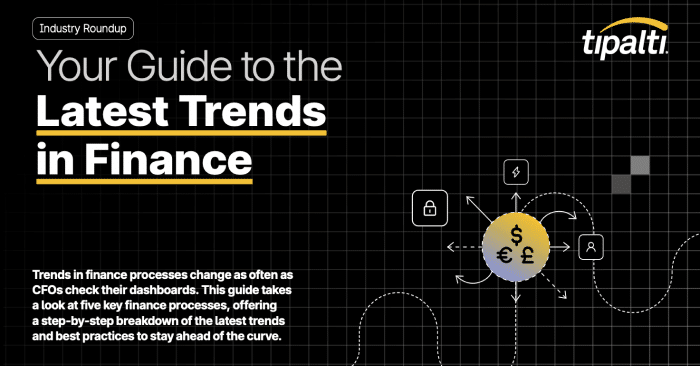
Finance trends shift fast—explore 5 key processes & tips to stay ahead.
Fill out the form to get your free eBook.

Trends in finance processes change as often as CFOs check their dashboards. This guide takes a look at five key finance processes, offering a step-by-step breakdown of the latest trends and best practices to stay ahead of the curve.
It’s not uncommon for CEOs, CFOs or COOs to find themselves debating the question of whether their company is in need of a procurement manager.
Companies can sometimes manage without a procurement manager. But having a person in charge of this role can make a tremendous difference in terms of keeping business processes running smoothly, lowering costs and positively impacting the company’s bottom line. With this, it’s no surprise that many top-level executives view procurement managers as vital to their operation.
Without a procurement manager…
When companies don’t have a person in charge of overseeing their purchasing activities, it’s typically the CEO or finance director who takes on this responsibility. There are a few issues that stem from this approach. For starters, this puts procurement in the realm of being a tactical activity rather than a strategic one. Anyone who isn’t a procurement manager might not have the specialized knowledge or bandwidth needed to properly ensure that the company is obtaining goods or services at competitive prices.
Another issue with the CEO, COO or finance director being in charge of overseeing procurement is that the management of vendors typically gets out of control. With information about which vendors the company is working with being saved in different systems or folders across the company, it becomes nearly impossible for anyone at the company to know which vendors the company is working with. Any time a need for a good or service arises, they might automatically initiate a new vendor onboarding process–ultimately spending time and money that could have been saved because the company is already working with a vendor for that need.
What businesses must recognize is that there are people spending the company’s money whose core competency lies elsewhere. Moreover, the savings that procurement managers can achieve can make much more of a positive impact on the company’s bottom line than the achievements of even a successful sales or marketing team. These realities should raise a red flag for companies that are currently operating without a procurement manager.
With a procurement manager…
Businesses that understand the strategic value of procurement and have a procurement manager in place enjoy a number of valuable advantages.
- Budgets and spending are properly controlled. A dedicated procurement manager works with every employee who plays a role in purchasing or procurement activities, ensuring that the actions they take are validated and in line with the company’s best interests. This includes ensuring that spending happens according to real-time budgets, thereby helping the Finance team control budgets and spending.
- Procurement managers find the deals that will most benefit the company financially. Sometimes, the lowest price doesn’t always translate to the best deal. Procurement managers examine all suppliers to determine who offers the best value for money, and they negotiate the best terms and conditions for the company.
- Procurement managers ensure an efficient procurement operation.
And an efficient procurement operation translates to a business that has the foundation to keep running. This depends on the procurement manager’s analytic and negotiating skills, as well as their ability to work with every stakeholder in order to achieve a procurement operation that supports the company’s strategic goals and improves the company’s bottom line.
Moreover, having a procurement manager gives the business a very valuable advantage of having someone who’s responsible for vendor management. This addresses the issue described above where vendor information isn’t readily available company-wide, resulting in wasted time and money onboarding new vendors. With a procurement manager responsible for managing vendor relationships, the company can avoid those added expenditures while also promoting healthier, long-term partnerships with the vendors they’ve already onboarded.
To conclude
Control over business spend is crucial for a company’s long-term health. While the CEO or head of finance can approve or reject purchase requests, a procurement manager can offer businesses the opportunity to embrace a strategic approach to purchasing that significantly impacts the company’s bottom line. Growing businesses should seriously consider hiring a procurement manager to ensure that their spending activities align with their long-term objectives.
